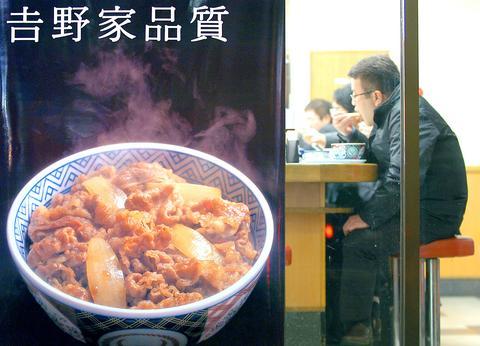One of Japan's largest fast-food chains has warned it'll be forced to stop serving its trademark dish, -- shredded beef and onions on rice -- unless authorities lift a ban on US beef imports imposed after the discovery of the US' first case of mad cow disease.
The announcement Tuesday by the Yoshinoya chain underlined the dilemma facing some restaurants in Japan, the world's biggest customer for US beef.

PHOTO: AP
News that a cow in Washington state tested positive last week for the brain-wasting bovine disease unnerved Japanese consumers, who've only recently regained their appetite for beef after a mad cow scare at home.
But for down-market eateries like Yoshinoya, whose 980 orange-and-white restaurants are a common sight on Japan's city streets, as well as in Taiwan, there's no substitute for inexpensive American beef.
Yoshinoya relies on US suppliers for 99 percent of the beef used in its trademark gyudon beef bowls -- which at ?260 (about US$2.50) are a staple for office workers and budget-conscious students.
Yoshinoya's president Shuji Abe called a news conference yesterday to announce that gyudon is being stricken from his menus unless Japan resumes US beef imports before the chain's stocks run out in February.
"I never thought our business would come to this," Abe said.
The company's sales have dipped about 15 percent since the US mad cow scare, and its shares took a beating on the stock market last week.
But Yoshinoya has stood by its product, insisting US beef is safe, and says finding a substitute would be too expensive.
"If our prices went up it would drag down our image," Abe said.
Japanese beef is typically pricier than imports, and often reserved for delicacies like sukiyaki -- thin strips of marbled meat boiled with vegetables.
At one Tokyo meat shop Tuesday, a kilogram of homegrown sukiyaki-quality beef was selling for about ?3,000 (US$28) -- about twice the price of comparable imported meat.
Japan imports about two-thirds of its beef, of which around 47 percent, or 226,524 tonnes, came from the US last year.
The rest comes mostly from Australia, which has never recorded a case of mad cow disease.
The Japan Food Service Association last week advised restaurants to rethink their entire business strategies.
"Relying completely on foreign procurement is risky," chairman Kiwamu Yokokawa said.
The US sold US$1.03 billion worth of beef, veal, prepared beef products and variety meats to Japan last year, accounting for about 32 percent of total exports, US data shows.

‘ABUSE OF POWER’: Lee Chun-yi allegedly used a Control Yuan vehicle to transport his dog to a pet grooming salon and take his wife to restaurants, media reports said Control Yuan Secretary-General Lee Chun-yi (李俊俋) resigned on Sunday night, admitting that he had misused a government vehicle, as reported by the media. Control Yuan Vice President Lee Hung-chun (李鴻鈞) yesterday apologized to the public over the issue. The watchdog body would follow up on similar accusations made by the Chinese Nationalist Party (KMT) and would investigate the alleged misuse of government vehicles by three other Control Yuan members: Su Li-chiung (蘇麗瓊), Lin Yu-jung (林郁容) and Wang Jung-chang (王榮璋), Lee Hung-chun said. Lee Chun-yi in a statement apologized for using a Control Yuan vehicle to transport his dog to a

BEIJING’S ‘PAWN’: ‘We, as Chinese, should never forget our roots, history, culture,’ Want Want Holdings general manager Tsai Wang-ting said at a summit in China The Mainland Affairs Council (MAC) yesterday condemned Want Want China Times Media Group (旺旺中時媒體集團) for making comments at the Cross-Strait Chinese Culture Summit that it said have damaged Taiwan’s sovereignty, adding that it would investigate if the group had colluded with China in the matter and contravened cross-strait regulations. The council issued a statement after Want Want Holdings (旺旺集團有限公司) general manager Tsai Wang-ting (蔡旺庭), the third son of the group’s founder, Tsai Eng-meng (蔡衍明), said at the summit last week that the group originated in “Chinese Taiwan,” and has developed and prospered in “the motherland.” “We, as Chinese, should never

‘A SURVIVAL QUESTION’: US officials have been urging the opposition KMT and TPP not to block defense spending, especially the special defense budget, an official said The US plans to ramp up weapons sales to Taiwan to a level exceeding US President Donald Trump’s first term as part of an effort to deter China as it intensifies military pressure on the nation, two US officials said on condition of anonymity. If US arms sales do accelerate, it could ease worries about the extent of Trump’s commitment to Taiwan. It would also add new friction to the tense US-China relationship. The officials said they expect US approvals for weapons sales to Taiwan over the next four years to surpass those in Trump’s first term, with one of them saying

INDO-PACIFIC REGION: Royal Navy ships exercise the right of freedom of navigation, including in the Taiwan Strait and South China Sea, the UK’s Tony Radakin told a summit Freedom of navigation in the Indo-Pacific region is as important as it is in the English Channel, British Chief of the Defence Staff Admiral Tony Radakin said at a summit in Singapore on Saturday. The remark came as the British Royal Navy’s flagship aircraft carrier, the HMS Prince of Wales, is on an eight-month deployment to the Indo-Pacific region as head of an international carrier strike group. “Upholding the UN Convention on the Law of the Sea, and with it, the principles of the freedom of navigation, in this part of the world matters to us just as it matters in the